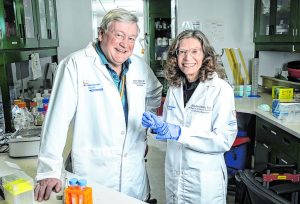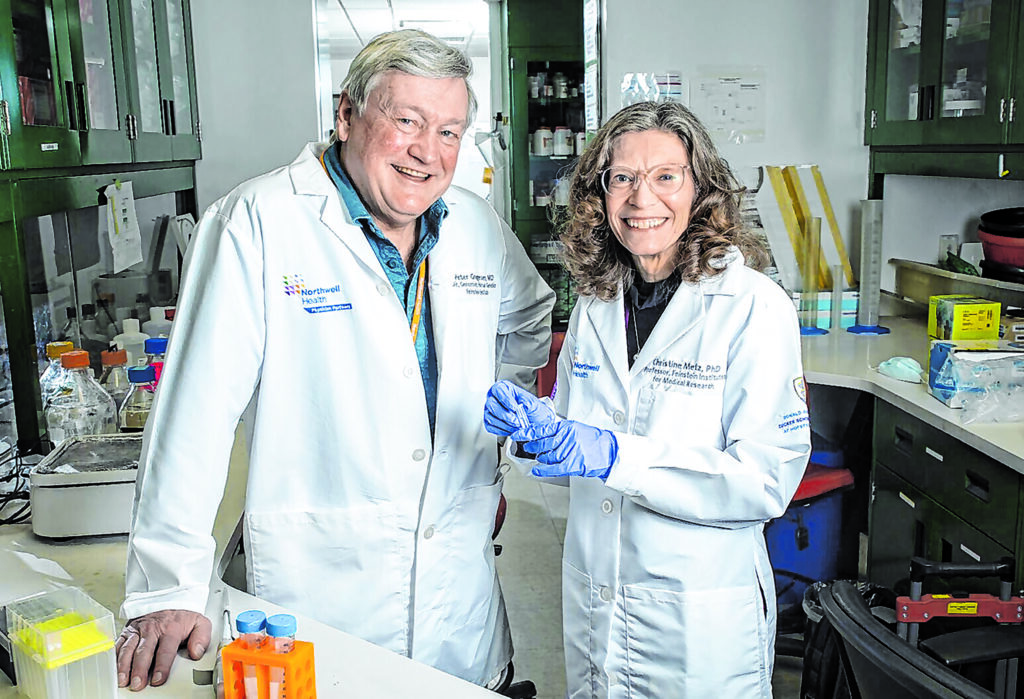
March is Endometriosis Awareness Month, a condition that affects 1 in 10 women. Many suffer in silence for an average of 8 years to get diagnosed. If their endometriosis is more mild, these women can go decades without proper care, which can have long-term effects on their health, including infertility.
That’s what happened to Megan Stade, 28, of Ronkonkoma, who had been experiencing debilitating cramps for nearly a decade with doctors telling her it was “just bad cramps” and to go on birth control to ease it. “I feel like a lot of people either don’t know about it or, you know, doctors will kind of just put it off as ‘Oh, you’re a young girl with bad periods. You know, you’ll be okay’. And then it kind of progresses and progresses to a point where you’re in excruciating pain,” she said when asked about her experience.
The constant unknown from the dozens of doctors she visited even took a toll on her mental health. “A lot of doctors…don’t know how to properly diagnose it yet because it is hard to identify. And you know, the only way to confirm you actually have it is to go under the knife, and I feel like a lot of doctors don’t want to send people that way.”
Having a definitive diagnosis has definitely made a difference in her overall outlook. “Moving forward, obviously I have peace of mind knowing that I kind of have it there and …if I do start getting that pain back again, I’ll have an idea why.”
What is Endometriosis?
Endometriosis occurs when endometrial-like tissue (normally found lining the uterus) grows outside of the uterus; endometriosis lesions are mainly found in the pelvic cavity, but can also be found in the lungs and other areas. Nearly 8.0 million women and girls suffer from endometriosis in the USA alone, and many more women and teens are likely undiagnosed. Symptoms can range from painful menstrual cramps to debilitating abdominal and pelvic pain and infertility. While the severity of endometriosis varies, the more extensive forms of the disorder can cause severe pain and disability. Approximately 40 percent of female infertility is associated with endometriosis.
But in the near future, instead of invasive, often costly-out-of-pocket diagnostic surgery, which delays treatment, soon menstrual blood could be used to diagnose the painful and complex condition. A new clinical trial is underway to make it a reality.
For more than 6 years, researchers at the Feinstein Institutes for Medical Research have been studying the use of menstrual blood to aid in diagnosis. More than 2,400 women nationwide have contributed their samples to the Researcher OutSmarts Endometriosis (ROSE) clinical study which has resulted in a series of research papers.
One of the participating doctors is Dr. Christine Metz, Professor in the Feinstein Institutes for Medical Research at Northwell Health, and professor in OB GYN in Department of OB GYN at the Donald and Barbara Zucker School of Medicine at Hofstra Northwell. She made the comparison between the current diagnostic model and investigating a fire. “It’s kind of frustrating because what you learn about the lesions, it’s like going to a house after it’s burned down and try to figure out who the arsonist was.”
While there have been a limited number of studies that have used endometrial tissue, this is the first of its kind to use menstrual blood to learn more about the health of the uterus. “No one had ever used menstrual blood as a biological specimen to learn about uterine health…There have been a few studies prior to ours looking at stem cells in the menstrual blood. But that’s because endometrium has to regrow every single month. Of course, it has these great stem cells, they can do that. But they were isolating them to treat all different kinds of health conditions that had nothing to do with the uterus. But we believe menstrual blood will tell us a lot about uterine health, infertility, fibrosis, abnormal bleeding, all sorts of interesting things that we would like to know about our health.”
Now in phase 2, the research team has kicked off a new clinical trial looking to enroll symptomatic woman to supply their blood prior to getting official diagnostic laparoscopic surgery. The goal is to validate the ability to predict diagnosis through the use of menstrual blood which will one day hopefully lead to an FDA approved non-invasive test.
If you’re a woman living with endometriosis or suspect you might have it, you may be eligible to participate in the Research OutSmarts Endometriosis (ROSE) study. Healthy “controls” (those without symptoms of endometriosis, see below) are invited to participate too. By participating, you could help researchers develop a better way to diagnose and treat this understudied condition.
To learn more about ROSE:
The ROSE research team (winner of the 2018 Northwell Innovation Challenge) is a group of Feinstein Institutes scientists and professionals who use several innovative approaches to study endometriosis and other women’s reproductive health disorders. Their goals are to reduce the time between symptoms of endometriosis and diagnosis; develop noninvasive (nonsurgical) methods to diagnose endometriosis; discover improved treatments for women with endometriosis; better understand the genetic basis of endometriosis and relate it to what is occurring at the cellular level in the disease, with emphasis on the role of stromal cells and the immune system; alleviate the pain and suffering among women with endometriosis; and learn more about uterine health
By participating in the ROSE study, you can help us reach these goals.
To Participate in Phase 2:
Complete an interest form or call (516) 562-3636 (ENDO) to find out how you can participate in the ROSE study.
If you are a woman with a diagnosis or suspicion of endometriosis who is over the age of 18 and not pregnant or breastfeeding, you will be asked to answer health/gynecological questionnaires, provide a sample of menstrual effluent (ME), collected in the privacy of your home, and allow researchers to collect excess endometrial tissue samples removed during surgery (optional).
If you are a woman without endometriosis who is over the age of 18 and not pregnant or breastfeeding, you will be asked to answer health/gynecological questionnaires and provide a sample of menstrual effluent (ME), which is collected by you in the privacy of your home.
Anyone participating in the study will be asked to fill out a consent form.
—With contributions from Northwell Health



































